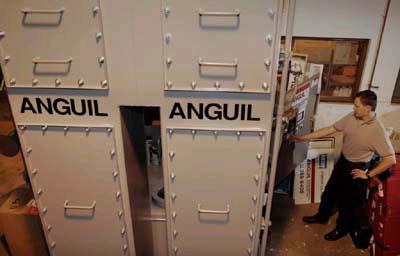Clearer skies overseas;
Anguil Environmental finds niche in global air pollution control
By RICK BARRETT rbarrett@journalsentinel.com
At a time when many Wisconsin companies are alarmed about business and technology being exported to Asia, a small Brown Deer firm is proving that it can compete overseas through contracts in Taiwan, Korea and China.
With only about 35 employees, Anguil Environmental Systems Inc. has become a global player in its field of designing and installing air pollution control equipment. About 25% of the company’s $20 million in annual sales comes from overseas business, including contracts from large conglomerates such as Hyundai Motor Co.
In December, Anguil landed three Asian orders to provide air pollution control equipment for Formosa Chemical Co. in Taiwan. The orders, totaling just under $4 million, followed a $1.5 million order from Hyundai for equipment at one of the Korean company’s plants in China. A weak U.S. dollar and strong economies in various regions of the world have helped American companies get overseas business, said Gene Anguil, founder and chairman of Anguil Environmental Systems.
“Exporters can do much better,” he said. “In some cases it’s cheaper to build something here and ship it overseas,” than to have the same product built in another country that’s closer to the end user.
Anguil designs and installs oxidizers, which look like large metal boxes perched atop the roofs of factories and printing companies. Pollutants that are emitted during manufacturing are channeled into the oxidizer, which uses heat to destroy the chemicals and convert them into carbon dioxide and water vapor.
Anguil has installed about 1,500 pollution control systems around the world, with its key markets being the United States, Taiwan and Europe.

The migration of international companies into China has helped Anguil’s sales, since the multinational organizations are already familiar
with pollution control requirements in their home countries.
“When these large companies establish plants in China, they don’t want to be perceived as having one set of environmental standards at home and another set of (weaker) standards for China,” Anguil said. “So that’s been a driver” of sales.
China has a pressing need for pollution control equipment. It has some of the world’s dirtiest air and is trying to clean things up in a short period of time, partly to gain acceptance by the international political community and the World Trade Organization.
Not all developing nations are trying as hard to improve the environment. Often there’s a constant battle between the economy and the environment, with clean air losing out to factories that produce jobs and contribute to a country’s economic growth.
“I think that will always be the situation,” Anguil said. “Even in this country, when the economy is not that good and our federal government is not that strong on the environment, we see companies dragging their feet for years” on installing pollution control equipment.
Anguil designs its own equipment, and company officials say aspects of the designs are sophisticated enough that it’s difficult for foreign competitors to copy them.
“We recognize the risk is there,” Anguil said. But companies that need pollution control systems usually don’t want to risk buying imitation systems, only to find out they weren’t effective and resulted in millions of dollars in air pollution fines.
Emphasis on engineering and problem solving can give U.S. companies a competitive edge, said Dale Wiza, chairman of the Milwaukee chapter of the Society of Automotive Engineers.
“There are things that can’t easily be copied,” he said.
